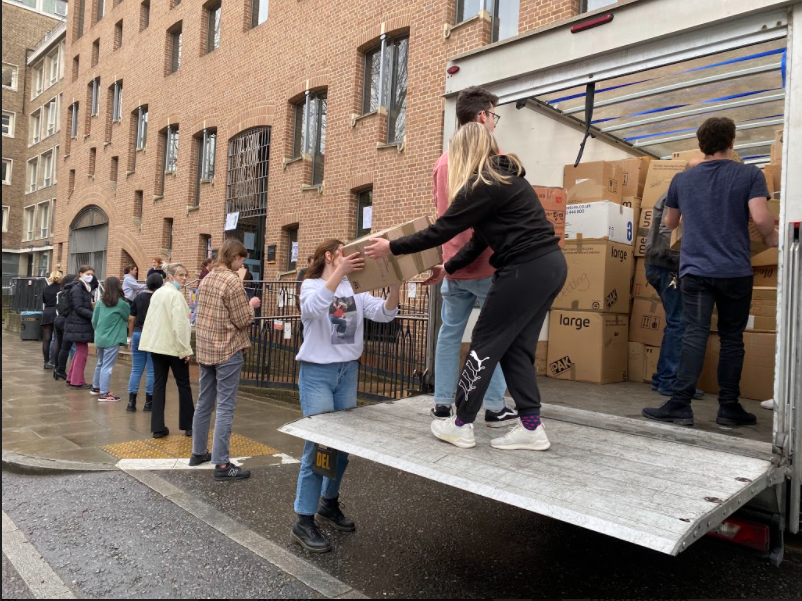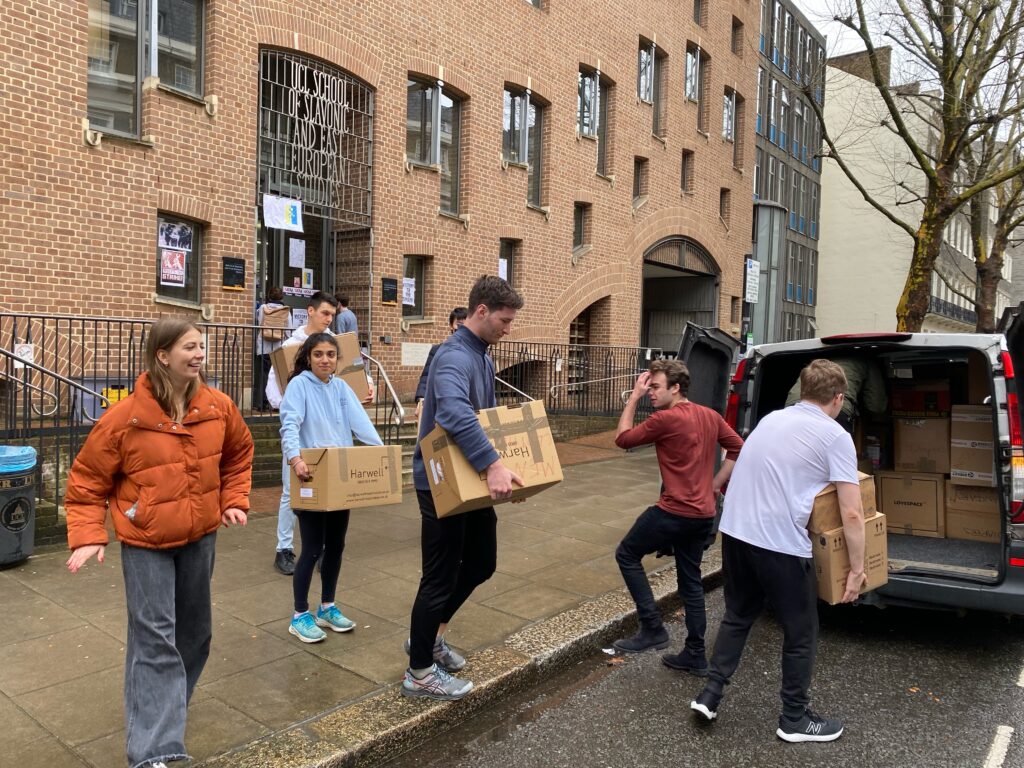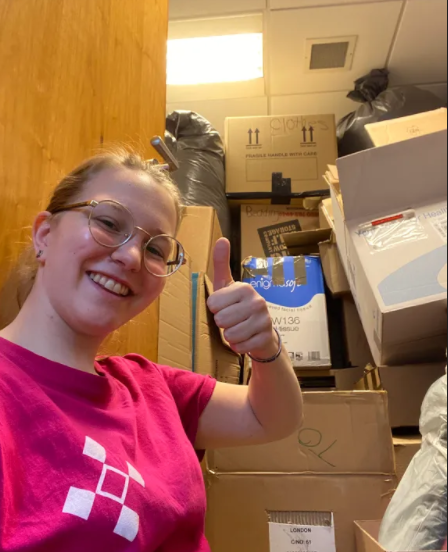
#IstandWithUkraine: The story of Freya
Freya Proudman is a Young European Ambassador based in London, UK. She is currently studying for a Master’s degree in comparative Russian and Eurasian politics from University College London School of Slavonic and East European Studies (UCL SSEES).
Freya has a passion for political science research involving post-Soviet politics, foreign policy, and social issues, including the treatment of LGBTQIA+ people and women. She also loves learning about languages and cultures.
Since the start of Russia’s aggression against Ukraine, Freya has done her best to get active and, together with the committee of the SSEES society, where she’s the Student President, support Ukrainians in need.
After a long brainstorming, they started working on a collection drive for essential supplies. It was extremely successful, and they managed to get food, medical equipment, toiletries, bedding, and clothing to a humanitarian aid hub in Lviv, Ukraine.
We decided to ask her how this experience had been, and what, in her opinion, young people in the EU and UK should do to help.
Here’s her story.
Hello Freya, thanks for talking to us and congratulations on the initiative, it’s great to see you managed to deliver necessary goods to those in need. Could you tell us a bit more about how it all started?
Of course. When I heard the news, I just felt powerless but was determined to find a way to help. I wasn’t sure what would be the most effective way to help but I knew that support was essential. My team at UCL SSEES Society spoke with several students as well as the UCL Ukrainian Society and we decided on a collection drive to gather essential supplies. We looked online and found a couple of collection drives in London, but none had been set up near our location in Central London.
We put out some calls on SSEES Society’s Instagram and UCL SSEES’ social media and started to gather food, supplies and thermal clothes.
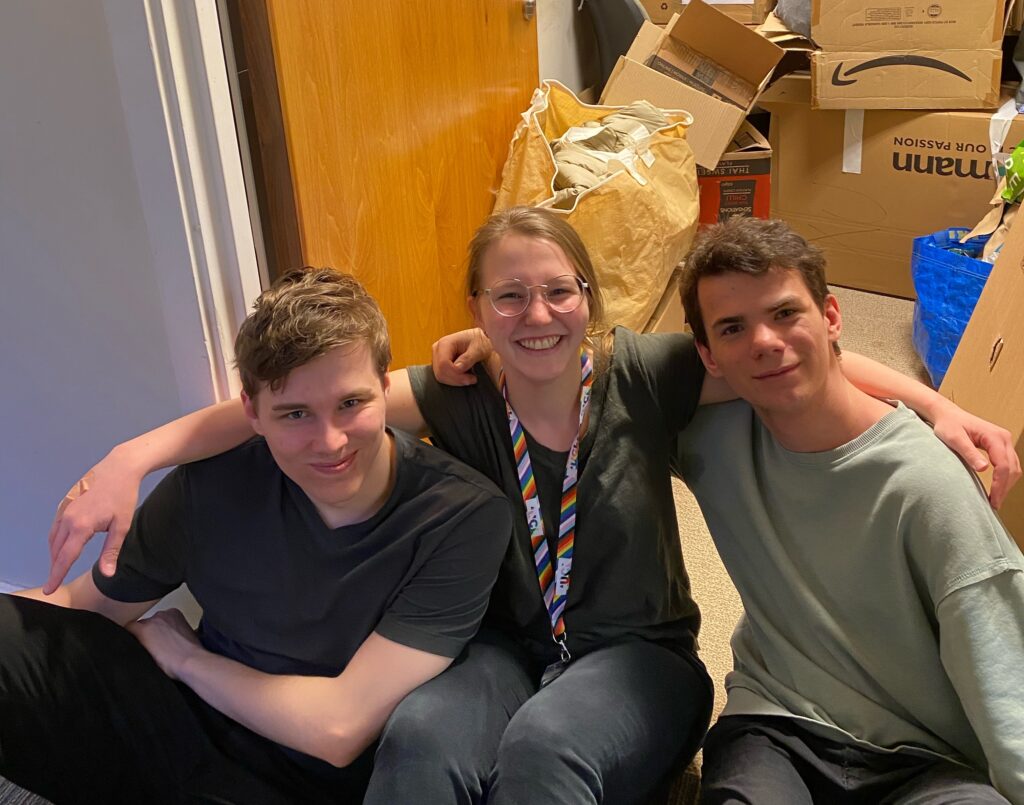
It sounds great, but I imagine it wasn’t easy. What were the biggest challenges you encountered?
Indeed, it wasn’t easy indeed, and there were many logistical challenges. One of our major concerns was that stuff would get stuck at the border, and from there it would be difficult to connect with transport companies on the ground.
Another challenge was making sure that the shipping company we used had the right paperwork to transport the food and medical supplies. Luckily, one of our UCL SSEES Student’s parents own a Ukrainian shipping company, UkayExpress, which has been transporting goods in partnership with Meest Group from London to Ukraine for over 10 years.
On Thursday, they stopped normal shipping and focused on shipping humanitarian goods. All our supplies are arriving at Meest Group’s humanitarian aid hub directly in Lviv.
Their support was extremely important and knowing there was a way for us to transport the donations directly into Ukraine, we immediately mobilised as largely as possible to fill several lorries with supplies over the following days.
Of course, another challenge was financing the operation. Each lorry costs around £2,000 to transport to Lviv. The first two lorries were covered by the shipping company, Ukayexpress, but we wanted to get involved in helping them crowdfund and find sponsors to fund additional lorry shipments. We have been using our social media channels to help raise funds for lorries.
Additionally, we needed support in getting the boxes of supplies from our UCL SSEES Building in Central London to the location where the UkayExpress Lorry was in East London. UkayExpress was able to help send some vans to pick up our boxes, but another company, 26Aviation, also funded several large Luton box trucks to come to SSEES to move our supplies to the location of the large lorry.
Speed was of the essence. We had to work quickly because help is urgently needed and as the conflict continues, more humanitarian support will be needed. We had some other issues to work through as well. There was also the concern about being able to guarantee that the lorries can continue to get to and from Ukraine. This is why establishing protected humanitarian corridors from Ukraine to EU countries is important, so the transportation of supplies can be guaranteed.
It was also hard to keep track of all messages and communications. UCL SSEES became the central hub for various London universities wanting to organise collection drives. We collaborated with King’s College London (KCL), The London School of Economics (LSE) Raising and Giving Society, and the School of Oriental and African Studies (SOAS) World Development Society. They would collect donations at their campuses, and UCL SSEES Society, with the support of 26Aviation, would organise the logistics of getting their donations to SSEES or directly to the lorry. We were receiving hundreds of messages about the collection drive on our SSEES Society Instagram, but also to my personal email and Twitter account, along with people ringing UCL SSEES directly. I had to assign several student volunteers the task of responding to messages and answering calls to clarify the initiative and coordinate with our sponsors and stakeholders seeking assistance. This is a very time-consuming process, but necessary to complete the task.
“I feel like I have a responsibility, and thus I must do something. Because this is the right thing to do.”
It was indeed challenging, a lot of things to take into consideration. What are the plans for the future?
We have recently received confirmation from our partners that it will be possible to get more lorries in Ukraine. This week, we are starting with the second week of donations, and by the end of the week, we plan to send two more lorries to the areas that most need it in Ukraine.
You can follow @sseessoc on Instagram for live updates regarding the drive.
This upcoming week we will also be focusing our attention on what we can do at our university, UCL, to better support our Ukrainian students studying here.
For sure, we’ll continue to participate in marches and demonstrations. We will also lobby for our University to support students that may still be abroad as well as financially assist Ukrainian students here.
What would be your suggestions to young people looking to do something similar?
Coordinate with other and bigger organisations to check if what you’re doing is the most effective way of supporting, and receive advice on how to coordinate efforts. We have heard that some goods (such as clothing) are not currently a priority, but medical equipment (first aid kits) and survival gear (power banks, torches, batteries) is greatly needed. Keep yourself well informed about the ongoing war and also be aware that the situation is changing very quickly. If you do plan to organise an event or collection drive, seek support from a group of people who can work together with you on this, and be prepared to be flexible. You may have to change aspects of your event due to the changing situation. Make sure you have all the support you need and that the tasks are well-distributed.
Thank you. We’re sure these words are very important for those who wish to contribute. Any last remark for our readers?
It’s not necessary to organise a big-scale project to have an impact. Read the news, support your friends, and go to marches. Every bit is important and every small contribution makes a difference.
LATEST

Building Europe: Poland’s experience of joining the European Union and lessons for Ukraine

World Health Day 2024: My Health, My Right

EUREKA MEETS EUROPE – opportunities to develop and study. My experience

Can you wear pink in the workplace?
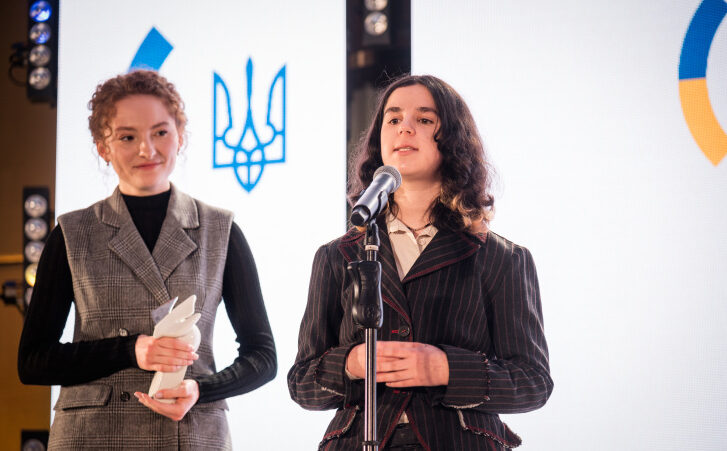
Go where your deepest fears lie: finding the courage to overcome gender barriers in STEM
More campaign pages:
Interested in the latest news and opportunities?
This website is managed by the EU-funded Regional Communication Programme for the Eastern Neighbourhood ('EU NEIGHBOURS east’), which complements and supports the communication of the Delegations of the European Union in the Eastern partner countries, and works under the guidance of the European Commission’s Directorate-General for Neighbourhood Policy and Enlargement Negotiations, and the European External Action Service. EU NEIGHBOURS east is implemented by a GOPA PACE-led consortium. It is part of the larger Neighbourhood Communication Programme (2020-2024) for the EU's Eastern and Southern Neighbourhood, which also includes 'EU NEIGHBOURS south’ project that runs the EU Neighbours portal.

The information on this site is subject to a Disclaimer and Protection of personal data. © European Union,
